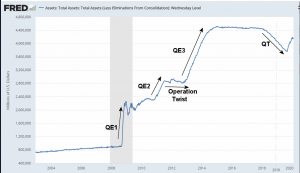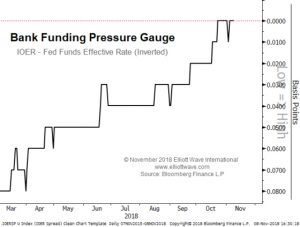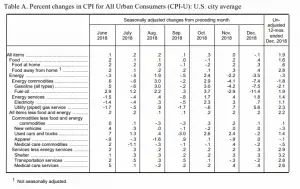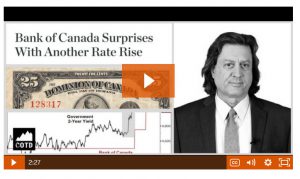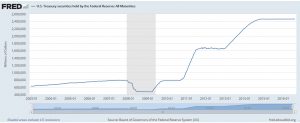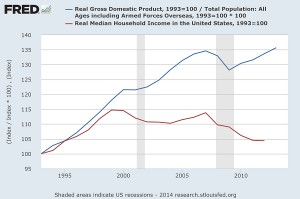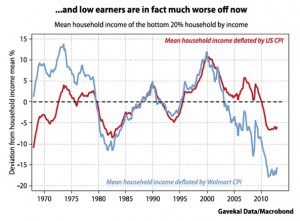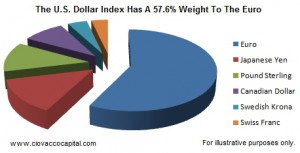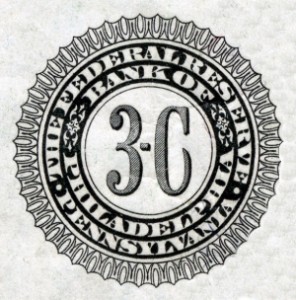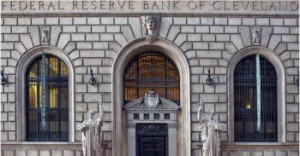When the government spends more money than it receives in taxes it has a “deficit” situation. In order to deal with this deficit, it engages in some fancy bookkeeping. The government is made up of a variety of agencies, so the other agencies request money from the Treasury Department. If it doesn’t have enough money the Treasury Department issues an IOU (called a Government Bond). The Treasury gives the Bond to the Federal Reserve (which is theoretically not part of the government). The FED writes a check to the Treasury for the bond. It then breaks up the bond into smaller bonds and sells them to individual banks. The banks then sell them to individual investors and groups of … [Read more...]
Are Deflationary Forces Taking Hold Again?
From the chart below we can see that deflation was an issue in 2009 as the market eliminated billions of dollars in assets when it crashed. The FED used all the tricks in the book to combat the contraction of the money supply including lowering interest rates to near zero and when that wasn't enough it began buying assets through its "quantitative easing" (QE) programs. But the deflationary forces weren't through yet and by 2015 the FED was once again battling deflation. In the chart below we can see that after dropping interest rates to almost zero they kept them there until 2016 when they increased rates very tentatively. But in 2017 they began raising rates a bit more … [Read more...]
2018 Ends with More Disinflation
The U.S. Bureau of Labor Statistics (BLS) released their monthly Consumer Price Index report on January 11th 2019, for January 1 through December 31, 2018. Annual Inflation is Down Annual inflation in December was 1.91% down from November's 2.18%. December's CPI was 251.233 which was below November's 252.038, below October, September and even below the 251.588 in May. Monthly Inflation for December was -0.32% virtually identical to November's -0.33%. Next release February 13th Monthly Inflation: According to the BLS commissioner's report, "In December, the Consumer Price Index for All Urban Consumers fell 0.1 percent on a seasonally adjusted basis; rising 1.9 percent over … [Read more...]
Believe Your Own Eyes: Central Banks FOLLOW the Market
Many investors believe that the market follows the FED's monetary leadership. This sounds right because the FED is the 500 pound gorilla in the market right? It has Trillions of dollars at its disposal and isn't afraid to use it. But is this actually the case? Believe Your Own Eyes: Central Banks FOLLOW the Market By Elliott Wave International 3 Videos + 8 Charts = Opportunities You Need to See. Join this free event hosted by Elliott Wave International and you'll get a clear picture of what's next in a variety of U.S. markets. After seeing these videos and charts you will be ready to jump on opportunities and sidestep risks in some major markets. This free … [Read more...]
July Inflation Down for 3rd Consecutive Month
The U.S. Bureau of Labor Statistics (BLS) released their monthly inflation report for July on August 16th. According to the BLS Annual Inflation declined for the third consecutive month. Annual inflation was 1.13% in April, 1.02% in May, 1.01% in June and 0.84% in July. Not only did the rate of inflation fall but actual consumer prices declined as the CPI-U index declined from 241.038 to 240.647. Thus monthly inflation was -0.16%. For the year food at home was down -1.6%, energy was down -10.9%, used cars and trucks were down -3.7%, while overall transportation was down -4.9%. With all of these categories down one might wonder what actually caused the inflation rate to rise that meager … [Read more...]
US Consumer Spending vs. FED Inflation Decision
The Fed will meet on the 16th and 17th of September to decide whether it’s time to normalize its accommodative monetary policy. But despite vice-chairman Stanley Fischer’s hints at an inflation increase in September, analysts still think that several factors complicate the FED’s decision. Recent turbulence in equities markets across the globe as well as uncertainties about China’s market are only some of the factors putting a damper on the economy. During an Economic Policy Symposium held in Wyoming this August, central bankers discussed how inflation would finally rise despite these issues. After all, the factors that had been holding it down (including fading oil prices, downward … [Read more...]
Poverty Matters for Capitalists
Having taken Thomas Piketty to the cleaners a few weeks back (see “Gave & Gave … and Hay”), Charles Gave now redresses the balance with regard to the issue of economic inequality in today’s Outside the Box. He makes a forceful case that “poverty matters for capitalists”: Every US recession that I can recall was preceded by a fall in long rates, and I doubt the next will be much different. As such, do not expect the next US downturn to arise from the Federal Reserve pushing rates higher, an overvalued dollar or even mal-investments. Expect it to result from a decline in the income of the working poor. Early warning signs are likely to show up in the shopping aisles of stores such as … [Read more...]
How Low Inflation in Europe Could Affect Your Investments in the U.S.
Last December, we explained why central bankers are terrified of economies that slip into a very difficult to stop deflationary spiral. European policymakers are not yet terrified, but it is fair to say they are concerned about what has been persistent low inflation. From Reuters: Euro zone price inflation fell unexpectedly in May, increasing the risks of deflation in the currency area and all-but sealing the case for the European Central Bank to act this week. Annual consumer inflation in the 18 countries sharing the euro fell to 0.5 percent in May from 0.7 percent in April, the EU’s statistics office Eurostat said on Tuesday. Fed Casts A Wider Economic Net Unlike the … [Read more...]
What are Excess Reserves and How Could they Spark Inflation?
How can you possibly have too many reserves? You would think that the more reserves the healthier the institution and so there would be no such thing as "excess reserves". We've mentioned this in previous articles such as FED Looks for New Ways to Crank Up Money Supply and How “Excess Reserves” and the Money Multiplier Could Trigger Inflation but excess reserves are in the news once again as Philadelphia Federal Reserve Bank President Charles Plosser says that that "excess reserves" could push inflation dramatically higher. Well, we have been telling you that for quite some time so it shouldn't be news to long time readers. But if you are new to InflationData... What are Excess … [Read more...]
Various Methods of Calculating Inflation
Why are There So Many Different Ways to Calculate Inflation? We've all heard the old saying, "Figures don't lie but liars figure" or perhaps "You can make numbers say anything you want". Both of these sayings contain the underlying assumption (or at least possibility) of malicious intent. But even if you have the raw data and just want to get at the truth, number calculations can present difficulties because the answer you get can depend on how you analyze it. For instance, you would think that if you want to know the "average" income of a group of 10 people it would be easy to calculate. And if all the incomes are relatively closely grouped it is easy... simply add them all up and … [Read more...]

